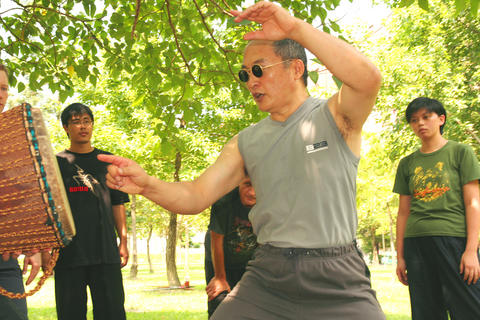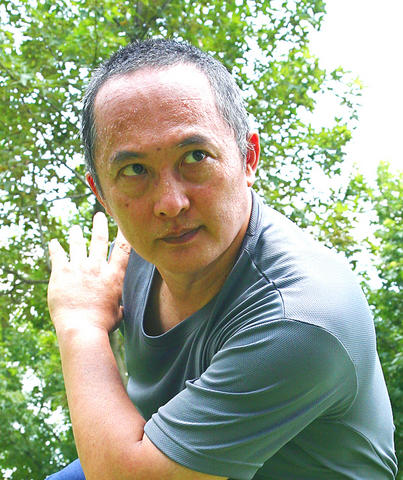Taiwan is a repository of martial arts that originated in China. Self-defense was necessary for early settlers from China and this flow of martial artists and related knowledge into the country turned into a flood after World War II.
One of the men who came with this flood was Gong Bao-zhai (宮寶齋), a fourth-generation master of bagua quan (八卦拳). He fled China with the Chinese Nationalist Party in 1949 and eventually agreed to pass on his skills and knowledge to He Jing-han (何靜寒), a retired military instructor and broadcaster who teaches bagua quan here, in the US and Europe.

PHOTO: JULES QUARTLY, TAIPEI TIMES
Taipei Times: How did Gong Bao-zhai come to Taiwan?
He Jing-han: The communists were coming so he had to go. His brother gave him some money and he left Qingdao for Shanghai and then came by boat to Taiwan. He left his wife and children behind but after one year, through an association, he managed to bring over his daughter and one son. His eldest daughter and son stayed in China. Those were tough times. He lost everything in just one minute.
TT: He was in the newspaper business, not in the army, how did he survive?

PHOTO: JULES QUARTLY, TAIPEI TIMES
HJH: He made money as a locksmith and then opened a bicycle shop. Later he opened a hardware store. He lived in Taipei, on Wenchiang Street, near Xinyi Road.
TT: How did you meet him?
HJH: I was in the army, in communications. I did electronic warfare, jamming, radar, detecting, interception, and missile and laser guidance. Many things. Very advanced. I met a professor who introduced me. Gong Bao-zhai wasn't actively practicing at the time. He was about 70 years old.
TT: You practiced tai chi chuan (太極拳) for about seven or eight years and tried other martial arts too. What did Gong teach you?
HJH: Most of the time he sat and told me what to do. Only sometimes would he demonstrate, when he thought I needed it. Through practicing skills you come to knowledge. With understanding, you have more knowledge. Sometimes he would teach me nothing but calligraphy, chess or opera, for a year. I lived with him from 1974 and was his disciple for 21 years, until he died at 96.
TT: Who founded the bagua system?
HJH: In the story, Dong Hai-chuan (董海川) is supposed to have gone into the mountains and met a Daoist priest. Usually the story is like this … . But I believe the bagua system is too sophisticated to have been developed in a short time by one person. Later, Dong was a servant at the imperial palace and on one occasion showed off his martial-arts skills. They were so good the emperor made him his bodyguard. Three generations [of bagua masters] served the emperor in the palace, until the Qing Dynasty collapsed.
TT: What is bagua?
HJH: Bagua is a system from tai chi. Basically, this is the development of the world from nothing. Tai chi is nothing. The starting point. It becomes two forces, the yin and the yang. The two forces collide and push together and become something, as basic as space, a material. Bagua is this result.
TT: What is bagua quan?
HJH: Bagua quan is a system that incorporates the physical martial arts and the bagua philosophy [see I Ching, or Book of Changes]. It's a combination. I think the original masters thought to themselves, "how can we express this theory in practice?" With our body. We call our body a small universe. They wanted to understand the big universe through our small universe.
TT: Martial arts means fighting, like Shaolin, doesn't it?
HJH: Shaolin School is a legend. It's a story, some parts are true, but people emphasize it too much. Most of it is marketing; it's a symbol for tourists. In that time many of the martial arts people were from the military. They killed many people and went to the temple with regret. It was the soldiers who taught the monks martial arts to help their health or protect their lands. You cannot say there is a Shaolin style.
TT: Was it just soldiers who studied martial arts?
HJH: Originally - in China, India, Japan and Europe - martial arts were only practiced by nobles, who controlled the land and looked after the people. Only they had the right to learn, to be educated and learn martial arts. Civilians were not allowed to have the power.
TT: How did martial arts develop?
HJH: Originally martial arts were a form of education, but when civilians started using them they just took what they needed to fight and the teachers just taught them the skills to protect themselves.
TT: Will bagua quan help win fights?
HJH: Use the training methods in a fight and you will lose. But they will prepare you for a fight.
TT: Have you had a fight?
HJH: Not a real fight.
TT: So how do you know it works?
HJH: Our ancestors have already proved that.
TT: But suppose you did have a fight, wouldn't it prove something?
HJH: Any kind of proof is fake. If you find someone to fight, in the ring, for instance, it's not a real fight. It's not true. Fighting is actually about life and death.
TT: So, why study bagua quan?
HJH: Fighting skills. Understanding of self. Improved health. You will be physically and mentally enhanced. You will have more self-confidence. You can improve yourself by yourself. Most modern people don't believe this. They think you need some help, some master or some organization to help you. No. Doing bagua, you will understand that you are responsible for your own improvement. All the old martial arts practitioners knew this.
TT: Not everyone can lead.
HJH: True. But you can be a leader of a troupe of 10 people or the leader of 10,000 troops. The point is, people should be more than tools.
TT: How would you define a leader?
HJH: A leader needs to be advanced. He or she should have the physical and mental ability to take pressure. This is very important. Everyone feels the pressure today is greater than the older days.
TT: But that's rubbish, isn't it?
HJH: It's fake. Sometimes people, say, want to finish a project overnight. And they cannot do it. This pressure is because their physical and mental abilities cannot cope. Most modern people, even children, have many abilities. This is why they cannot cope. So, everything becomes stressful.
TT: How does bagua quan help people deal with pressure?
HJH: Bagua quan training can raise your physical and mental abilities. Suppose your physical and mental abilities are like a ship. If you have many abilities, you are like an aircraft carrier. You can take more things. For some kids and people they are like small ships and cannot bear such a load. They sink.
TT: What physical benefits are there from doing bagua quan?
HJH: Bagua trains specific muscles, joints and tendons. It makes them supple. It makes women stronger, for instance. Train in a contrary way and you will make a weakness a strength. Practice what you can't do, since what you can do is already a strength and will develop naturally.
TT: It sounds like common sense.
HJH: Bagua teaches good habits, tried and true, like leaves facing upward. You make a choice of your habits, if you think about it.
TT: So, what's the difference between a good teacher and a bad one?
HJH: Teaching fighting skills is very easy, but teaching people to understand is difficult. So there are few people teaching people this way. Teaching is not only a skill but also a culture.
TT: Anything else?
HJH: Real understanding comes not from a book or a teacher but from yourself.
Go to YouTube for a video of a recent lesson by He: www.youtube.com/watch?v=TmvDjHdRqO0. He Jing-han is currently teaching in Europe, but can be contacted on baguaquan@giga.net.tw or through www.baguadaoyin.com.

On April 26, The Lancet published a letter from two doctors at Taichung-based China Medical University Hospital (CMUH) warning that “Taiwan’s Health Care System is on the Brink of Collapse.” The authors said that “Years of policy inaction and mismanagement of resources have led to the National Health Insurance system operating under unsustainable conditions.” The pushback was immediate. Errors in the paper were quickly identified and publicized, to discredit the authors (the hospital apologized). CNA reported that CMUH said the letter described Taiwan in 2021 as having 62 nurses per 10,000 people, when the correct number was 78 nurses per 10,000

As we live longer, our risk of cognitive impairment is increasing. How can we delay the onset of symptoms? Do we have to give up every indulgence or can small changes make a difference? We asked neurologists for tips on how to keep our brains healthy for life. TAKE CARE OF YOUR HEALTH “All of the sensible things that apply to bodily health apply to brain health,” says Suzanne O’Sullivan, a consultant in neurology at the National Hospital for Neurology and Neurosurgery in London, and the author of The Age of Diagnosis. “When you’re 20, you can get away with absolute

May 5 to May 11 What started out as friction between Taiwanese students at Taichung First High School and a Japanese head cook escalated dramatically over the first two weeks of May 1927. It began on April 30 when the cook’s wife knew that lotus starch used in that night’s dinner had rat feces in it, but failed to inform staff until the meal was already prepared. The students believed that her silence was intentional, and filed a complaint. The school’s Japanese administrators sided with the cook’s family, dismissing the students as troublemakers and clamping down on their freedoms — with

As Donald Trump’s executive order in March led to the shuttering of Voice of America (VOA) — the global broadcaster whose roots date back to the fight against Nazi propaganda — he quickly attracted support from figures not used to aligning themselves with any US administration. Trump had ordered the US Agency for Global Media, the federal agency that funds VOA and other groups promoting independent journalism overseas, to be “eliminated to the maximum extent consistent with applicable law.” The decision suddenly halted programming in 49 languages to more than 425 million people. In Moscow, Margarita Simonyan, the hardline editor-in-chief of the